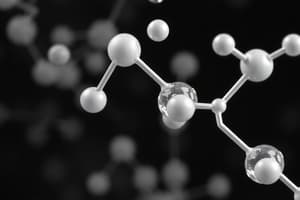Podcast
Questions and Answers
What is a full agonist?
What is a full agonist?
- Drug with high affinity to a receptor and low efficacy
- Drug with high affinity to a receptor and high efficacy (correct)
- Drug with low affinity to a receptor and high efficacy
- Drug with moderate affinity to a receptor and moderate efficacy
What characterizes a partial agonist?
What characterizes a partial agonist?
- Low efficacy and slow rate of association and dissociation with the receptor
- High efficacy and rapid rate of association and dissociation with the receptor
- High affinity and weak association with the receptor
- Weak efficacy and moderate association and dissociation with the receptor (correct)
Which drug acts as an antagonist in the presence of a full agonist?
Which drug acts as an antagonist in the presence of a full agonist?
- Phenylephrine
- Adrenaline
- Morphine
- Nalorphine (correct)
Which drug is an example of a full agonist?
Which drug is an example of a full agonist?
What type of antagonist competes with the agonist for the same receptor site?
What type of antagonist competes with the agonist for the same receptor site?
Which type of antagonist binds irreversibly to the receptor site or to another site?
Which type of antagonist binds irreversibly to the receptor site or to another site?
What effect does a competitive antagonist have on the potency of the agonist?
What effect does a competitive antagonist have on the potency of the agonist?
Which drug antagonizes adrenaline on beta-adrenergic receptors?
Which drug antagonizes adrenaline on beta-adrenergic receptors?
What type of shift does a non-competitive antagonist cause in the dose-response curve?
What type of shift does a non-competitive antagonist cause in the dose-response curve?




